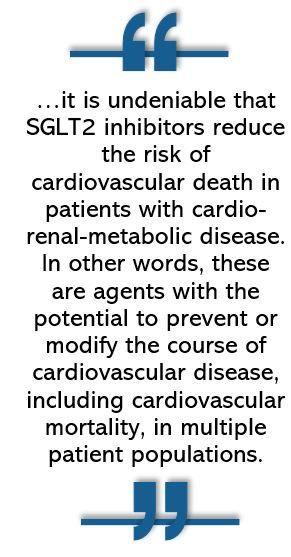SGLT-2 Inhibitor HF, CV Benefit Found Consistent Across Populations with T2D, CKD, HF
Sodium-glucose cotransporter-2 (SLGT2) inhibitors reduced risk for heart failure (HF) events and cardiovascular (CV) death among patients with either HF, type 2 diabetes (T2D), or chronic kidney disease (CKD) and in those with varying combinations of the 3 diseases, according to findings from a meta-analysis that included more than 90 000 patients.1
Compared with placebo across studies, SGLT-2 inhibitors reduced the risk of a first HF hospitalization (HHF) or CV death by an average of 23% in study participants with HF, T2D, and CKD and the effect remained consistent when any combination of these conditions were comorbid. SGLT-2 inhibitors also significantly reduced CV mortality by an average of 14% in patients with each of the 3 diseases.
©Fandorina Liza/Adobe Stock

“Type 2 diabetes, HF and CKD frequently overlap, but the effect of SGLT2 inhibitors in patients with varying multimorbidity remains less clear because the individual trials were underpowered to assess subpopulations,” Muhammad Shariq Usman, MD, research fellow and cardiovascular outcomes researcher at the University of Mississippi Medical Center, and colleagues wrote in the Journal of the American College of Cardiology.
Concerns have surfaced also that the benefits seen with SGLT-2 inhibitors “may be attenuated in the presence of multiple comorbidities,” the investigators continued. Inconsistent results across individual trials have also left uncertainty about the effect of SGLT-2 inhibitors on CV death specifically. The systematic review and meta-analysis was designed to evaluate the effect “of SGLT2 inhibitors on outcomes in subgroups of patients with varying combinations of CV, kidney and metabolic comorbidity.”
Usman and colleagues searched the Medline, Scopus, and Cochrane Central databases from inception through November 2022 for analyses, either primary or secondary, of randomized controlled trials (RCTs) that compared SGLT2 inhibitor therapy with placebo in patients with HF, T2D, CKD, or any combination. Outcomes of primary interest were a composite of first HF hospitalization or CV death, first heart failure hospitalization, or CV mortality. Random effects models were used to determine HR and 95% CIs.
A final group of 13 trials met eligibility criteria comprising data from 90 413 participants. Of the total, 48 485 individuals received SGLT2 inhibitors and 41 928 received placebo. The mean age of participants was 65 years and 33% were women.
FINDINGS
Results of the analysis showed SGLT2 inhibitors, compared with placebo, reduced the risk of first HFF and/or CV death by 24% in HF (HR, 0.76; 95% CI, 0.72 - 0.81), 23% in T2D (HR, 0.77; 95% CI, 0.73 - 0.81), and 23% in CKD (HR, 0.77%; 95% CI, 0.72 - 0.82).
Usman et al reported a consistent benefit of SGLT-2 therapy in patients with HF with reduced or preserved ejection fraction, those with HF both with and without T2D, and in patients with HF with or without CKD. In patients with T2D, they reported consistent benefits in those with or without CKD and in those without HF, as well as in patients with CKD without HF. The benefit was seen in participants with all 3 conditions.
Addressing the question about the effect of SGLT-2 inhibitor therapy specifically on CV mortality, the researchers reported a significant reduction in CV death of 16% in patients with HF, 15% in those with T2D, and 12% in those with CKD. SGLT2 inhibitors also were associated with a reduction in first HFF specifically of 29% in HF, 29% in T2D, and 32% in CKD.

The team noted one discordant finding, that among patients with CKD without T2D, there was no reduction conferred by SGLT-2 therapy in risk for first HFF and/or CV death. Given that data on this population were available from only 2 studies, however, they suspect the finding may be the result of underpowering and not lack of effect.
“These findings support a ‘call to action’ for the widespread adoption of the use of SGLT2 inhibitors across all 3 patient populations,” the investigators concluded.
Commenting in an accompanying editorial,2 cardiologists Stephen Wiviott, MD, and David Berg, MD, MPH, both from Brigham & Women’s Hospital and investigators with the TIMI Study Group, wrote “it is undeniable that SGLT2 inhibitors reduce the risk of cardiovascular death in patients with cardio-renal-metabolic disease. In other words, these are agents with the potential to prevent or modify the course of cardiovascular disease, including cardiovascular mortality, in multiple patient populations.”